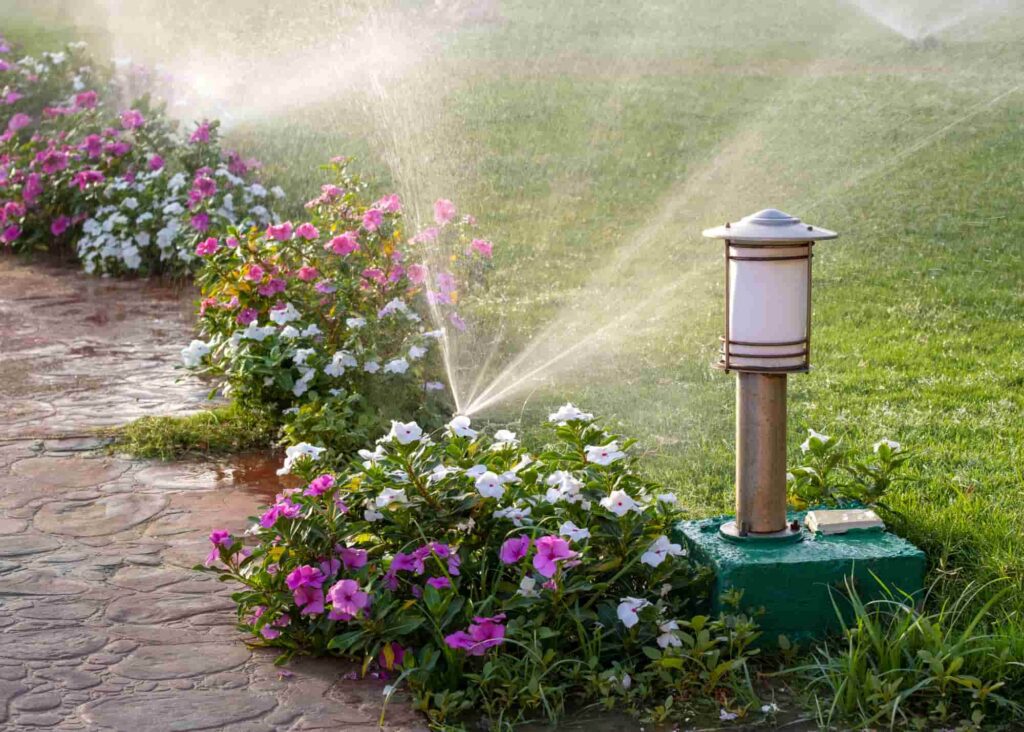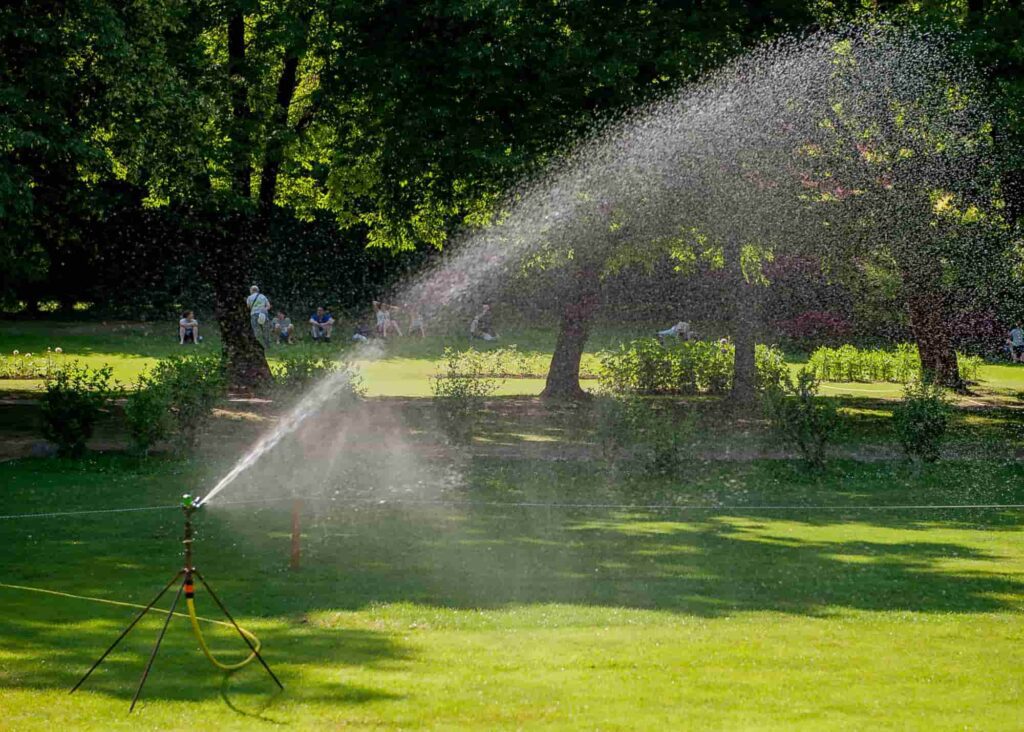Commercial and residential property owners often take pride and enjoyment in their yards. Landscaping features can reflect the personality of a property, increase curb appeal, and highlight beautiful and unique outdoor havens.
Nevertheless, a healthy landscape requires consistent care and maintenance. Over or underwatering your lawn, plants, and gardens can kill your landscape and create numerous challenges and eyesores. Landscape irrigation is key to maintaining a beautiful landscape.
You need the right irrigation system to ensure your landscape receives the vital nutrients and moisture it needs to thrive. Here’s a breakdown of how landscape irrigation works and how to choose an irrigation system that works for your unique landscape.
What is a landscape irrigation system?
An irrigation system in landscaping is a way to efficiently provide consistent water supply for plants. Rather than rely on manual labor and watering methods, irrigation systems can be programmed for watering your yard at specific times.
These systems ensure water is evenly distributed, promote healthy plant and grass growth, and when used correctly, help to prevent dry or dead spots and soil erosion.
According to the U.S. Environmental Protection Agency (EPA), landscape irrigation accounts for one-third of all residential water use, and 50% of all outdoor water use is directed toward irrigation. Thus, it’s important to ensure that you’re using an effective system that’s right for your climate, and that doesn’t contribute to water waste.
Types of irrigation systems for your landscape
It’s good to understand the different types of irrigation systems available for your landscape for efficient water use. Depending on where you live in the country, your state or local region may have restrictions on outdoor irrigation due to droughts or limited water supply.
Using the right landscape irrigation system can compensate for any water restrictions and ensure your yard stays lush and healthy.
The types of irrigation systems used for landscape watering can be combined with manual methods and include:
Drip Irrigation
A drip irrigation system for your landscape directly distributes water to plant roots and promotes healthy plant growth. This system reduces water loss from evaporation and uses a network of pipes, water lines, emitters, pressure regulators, and filters to ensure water is precisely and slowly delivered to targeted plant roots.
Drip irrigation systems either distribute water via subsurface points buried below your soil’s surface or above the soil surface, using drippers or emitters to control the flow of water.
This system may be difficult to correctly implement as a DIY project, but the right landscaping specialists can design and install a drip irrigation system.
In-Ground Sprinkler Irrigation
An in-ground sprinkler irrigation system for your landscape utilizes underground pipes that are connected to sprinkler heads placed strategically in different areas of your yard. The sprinkler heads appear when the system is activated through an automatic timer.
Great for larger yards, in-ground sprinkler irrigation evenly distributes water and prevents overwatering.
Smart Irrigation
Recent “smart” technologies can be utilized in landscape irrigation, too. A smart irrigation system uses technology to target specific areas of your yard, like dry spots, flowerbeds, and gardens.
This automated system collects data on the various factors that may lead to necessary watering, such as weather conditions, soil health, and plant growth, and automatically adjusts your watering schedule.
Subsurface Irrigation
Subsurface irrigation systems share a similar design with drip irrigation systems, as both types of landscaping irrigation use underground pipes to water plants directly at their roots.
However, a drip system utilizes aboveground points as well as underground channels. A subsurface irrigation system is completely buried and distributes more water, more consistently than its drip counterpart.
Surface Irrigation
Surface irrigation is the most inexpensive and commonly used irrigation method for residential landscaping irrigation. However, it’s also the most inefficient and labor intensive way to manage irrigation.
Surface irrigation involves using methods like hand watering with a hose or setting up a basic, non-automated sprinkler to water your lawn, and can work on small areas, but the larger the yard, the more difficult surface irrigation can be for effective irrigation and water distribution.
How is an irrigation system beneficial for your lawn and landscaping?
Utilizing an irrigation system isn’t just beneficial for your lawn and landscaping — it’s vital to the health of your yard. Even if you live in a humid, moisture-rich climate, strategic irrigation can promote the beauty of your landscape.
Investing in an irrigation system is an important aspect of landscaping as it can reduce your water waste, save you time and labor, improve the appearance of your landscape, and even save you long-term costs.
Here are the beneficial reasons you should weigh when considering an irrigation system for your landscape:
- Consistent Watering:
It can be tough to produce a consistent and evenly distributed watering schedule when manually irrigating your lawn. Implementing an automated irrigation system can ensure every area of your yard and landscaping elements receive necessary, nourishing moisture.
- Healthy Landscape Growth:
An irrigation system promotes healthy landscape growth by ensuring water is distributed to the plants and lawn areas that need it the most. You need irrigation to protect your landscaping elements from drought and disease, and to enjoy a lush, thriving lawn.
- Increased Property Value:
A healthy landscape increases curb appeal, which in turn, increases the value of your property. An attractive yard can become a focal point if you put your home on the market.
- Reduced Labor and Time:
Hand watering your lawn can be extremely time-consuming and labor-intensive. An automated irrigation system frees you up to enjoy the outdoors without having to stress out about maintaining a consistent watering schedule. You’ll also avoid the oversaturation or underwatering of your lawn.
- Reduced Weed and Fungal Growth:
Effective irrigation systems reduce fungal growth by minimizing the risk of oversaturation and watering at the right time of day for your local climate. Automated irrigation systems promote vital air circulation and deep, healthy plant roots which also reduces the risk of hazardous fungal growth.
Irrigation systems reduce weeds by creating unfavorable conditions for weeds to thrive, using targeted watering, reducing soil erosion, and preventing weed germination from overwhelming your lawn and landscape elements.
- Water Conservation:
Using an automated, timed irrigation system for your landscape is more efficient than manual watering. A system significantly reduces water waste, which is great for the environment — and for your water bill.
Landscaping Irrigation FAQ
Should I hire professional landscapers to install my irrigation system?
It’s a good idea to hire professional landscapers to recommend and install your landscaping irrigation system. The right specialists understand the complexities of your local climate, are experienced in efficient installation, and can correctly install your system in a shorter amount of time than you may be able to do on your own.
What maintenance does a landscape irrigation system require?
You should perform a maintenance check on your landscape irrigation system at least once per month and schedule seasonal inspections. Occasionally, you may want to hire professionals to thoroughly check and ensure the efficiency of your system.
Minor wear and tear repairs are to be expected. However, if properly installed, your system should continue to run smoothly.
What happens if I overwater my lawn?
Overwatering your lawn can cause a multitude of costly issues, especially if you don’t have the right yard drainage system installed. The challenges caused by overwatering include:
- Compacted soil
- Drowning of healthy plant roots
- Fungal growth
- Insect infestation
- Shallow root system
- Soil erosion
- Standing water and swampy conditions
- Weed growth
- Yellow grass
Founded in Naperville, Illinois over twenty years ago, family-owned and operated Ware Landscaping is dedicated to offering premium, customized landscaping and drainage solutions for our Chicago area neighbors. We’re committed to helping you get the most out of your yard.
Connect with us with any questions you may have about irrigation systems for your landscape, and check out our website to explore the comprehensive services we offer.










